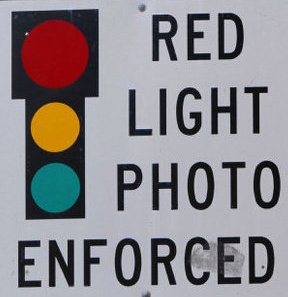
Florida reporters recently discovered that lawmakers shortened the length of yellow lights, ostensibly in an effort to snare limit-pushing drivers who are accustomed to an extra second or two.
Red-light cameras: the city and the red-light service claims the program’s purpose is increased safety. According to the red light services website, “The goal of the program is to reduce the number of right-angle collisions and related casualties citywide by 25 percent through the incremental expansion of automated photo and video cameras within the City of Dallas.” Read: they are steadily adding more of these cams that can, both physically and legally/financially get you in a jam. (Red light runners, however, can cause far worse problems.)
But investigations earlier this year indicate that money — perhaps as much or more than the nobel desire for safer streets — is a motivating factor (not exactly a shocker). Some traffic lights near our neighborhood, by the way, are big moneymakers — Forest Lane-Plano and Mockingbird-Central are major players.
NBC 5 secured, via an open records requests, emails between city officials noodling around ways to increase the revenue from both red-light cameras and parking violations. Essentially, according to the report, city management recently has been lamenting the decreasing number of red light runners (rather than cheering the effectiveness of the program in preventing reckless red-light running) and trying to figure out ways to ensnare drivers in the red-light-offender system. Of course, if it’s boosting safety, no problem. And if it helps balance the budget, super-great. Right?
Well, there also are the nagging issues of a right to legal due process and temptation toward municipal-level sneakiness to push drivers into a law-breaking situation. Take Florida, for example, where it just was discovered that lawmakers shortened the length of yellow lights, ostensibly in an effort to snare limit-pushing drivers who are accustomed to an extra second or two. Not saying Dallas would do or has done this — or have they?
And several cities have powered-down their red-light camera programs, citing constitutional rights breeches. Sioux Falls, South Dakota, for example, shut down its cameras following a lawsuit claiming that “the cameras violate due-process rights because they don’t capture images of those who actually are behind the wheel,” Associated Press reports.
In some cases, street cameras have come in real handy.
Back to our ‘hood, if you receive a violation notice and you wish to dispute it, our city and the red-light company Safelight make it quite the hassle to do so.
Say, perhaps, you sold your car the day before the camera caught it running the light, or you were issued a ticket for what you believe was a legal turn-on-red — not to mention if your sister borrowed your car and ran two red lights in one day (Why is the car owner responsible? If the car owner wasn’t in the car? If my sister was driving my car drunk and smashed into someone’s fence, I would not be jailed, right? Why is it different here — because it is civil and not criminal? Also note: not that any of this has necessarily happened) — and you wish to plead your case, well, you’ll have to jump through some hoops and endure painful dealings with municipal offices and paperwork and notaries.
You can appeal at the municipal level through the Department of Court and Detention Services by appearing in person, paying a $15 fee, presenting a notarized statement of insurance, and filling out appeal forms. It’ll cost you some $10 to park down there at the DCDS. By the time the hassle is played out, you’ll likely wish you’d just paid the $75 ticket.
Of course, you could do with your red-light violation what thousands in Dallas, Austin and presumably everywhere else have done: ignore them.
While the red-light programs have been OKed in most cities, the tools and power with which to enforce the related fines are lacking.
An Austin city official admits red light tickets are practically unenforceable. “While unpaid parking tickets can lead to booting and towing, and old traffic violations can prompt arrest warrants, ignoring a red light ticket doesn’t create serious repercussions,” an Austin municipal court clerk told KVUE. A Dallas-county officer concurs to the Morning News, “As long they don’t mind being badgered by a bill collector and that kind of stuff, there’s not a lot we can do.”
Safelight can send the notices to a collection agency but, reportedly under state law, major credit agencies are not alerted to violators’ lack of payment, so a your credit score will not be impacted, should you choose to toss the ticket in the junk mail pile.
Still, the majority of violators, about 60-percent, whether out of fear or habitual rule-abidement, choose to pay up.





